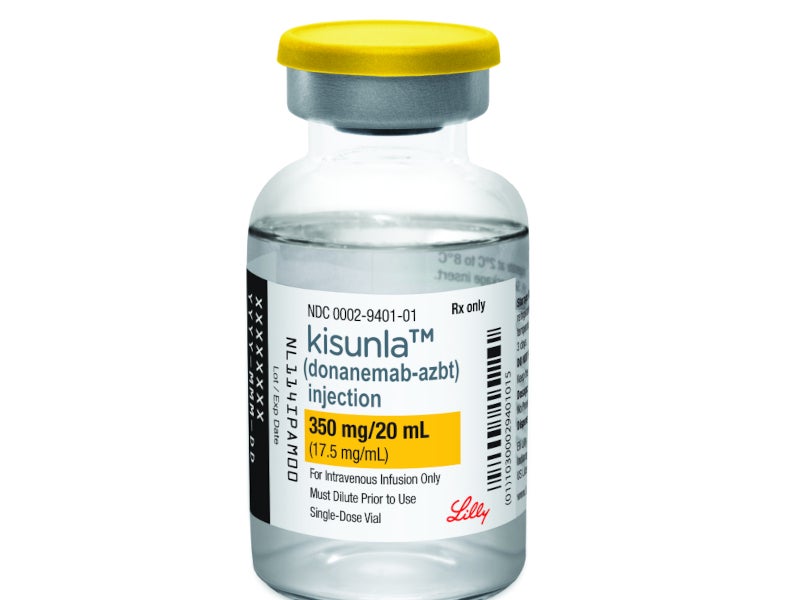Kisunla™ (donanemab-azbt) is a disease-modifying therapy (DMT) for adults with early symptomatic Alzheimer’s disease (AD), encompassing those with mild cognitive impairment (MCI) and those in the mild dementia stage of AD, with confirmed amyloid pathology.
Developed by Eli Lilly and Company, Kisunla is designed to target and clear amyloid plaques, potentially reducing treatment costs and the frequency of infusions by ceasing therapy post-plaque elimination.
Kisunla is formulated as 350mg/20ml clear to opalescent and colourless to slightly yellow or slightly brown solution, supplied in a single dose vial for once-monthly intravenous infusion. Administered via a needle inserted into a vein in the arm, each session lasts approximately 30 minutes.
Regulatory approvals
The US Food and Drug Administration (FDA) approved Kisunla in July 2024, making it the second DMT to reach the AD market in the US after Leqembi™ (lecanemab). The drug holds Fast Track Review, Priority Review and Breakthrough Therapy designations.
The FDA approved an update to the prescribing information for Kisunla™ in July 2025, recommending a new dose-titration schedule based on the results of the TRAILBLAZER-ALZ 6 study.
In September 2025, Kisunla received marketing authorisation from the European Commission (EC) for the treatment of early symptomatic AD in adults.
AD causes and symptoms
AD, the most prevalent form of dementia, is a progressive brain disorder. It may arise from the natural production of amyloid protein, which can accumulate and form amyloid plaques, leading to memory and cognitive difficulties characteristic of AD.
Symptoms include memory loss, language troubles, impaired judgment, mood and personality changes, movement issues, altered sense of smell and sleep disturbances. Approximately 6.7 million people aged 65 and older in the US were estimated to be living with AD in 2023.
Kinsula’s mechanism of action
Kisunla (donanemab-azbt) is a humanised immunoglobulin gamma 1 (IgG1) monoclonal antibody targeting insoluble N-truncated pyroglutamate amyloid beta. Its amyloid-targeting mechanism was validated in the TRAILBLAZER-ALZ 2 clinical study.
The drug demonstrated a reduction in amyloid beta plaques in the brain – a characteristic pathophysiological feature of AD.
Clinical studies on Kisunla
TRAILBLAZER-ALZ 2, a Phase III clinical trial from the TRAILBLAZER-ALZ programme, has been pivotal in assessing the safety and efficacy of Kisunla for individuals with early symptomatic AD, specifically those with MCI or mild dementia due to AD and confirmed AD neuropathology.
The double-blind, placebo-controlled trial involved 1,736 participants from eight countries, chosen through cognitive assessments and evidence of AD pathology. Participants were assigned in equal measure to receive either 700mg of Kisunla every four weeks for the initial three doses, followed by 1,400mg at the same interval, or a placebo for up to 72 weeks.
The treatment regimen was subject to alteration to a placebo based on amyloid positron emission tomography (PET) levels assessed at the 24th, 52nd,and 76th weeks. A switch to placebo was considered if amyloid plaque levels fell below 11 centiloids on a single positron emission tomography (PET) scan or ranged between 11 and less than 25 centiloids across two consecutive scans. Centiloids provide a standardised, quantifiable measure of amyloid plaques in the brain.
The trial’s primary efficacy endpoint was the variation in the integrated AD Rating Scale (iADRS) score, which spans from zero to 144, from baseline to the 76th week.
The iADRS amalgamates the AD Assessment Scale-Cognitive subscale and the Alzheimer’s Disease Cooperative Study – Instrumental Activities of Daily Living scale, with lower scores indicating poorer cognitive and functional performance.
Patients treated with Kisunla™ exhibited a statistically significant deceleration in clinical decline on the iADRS at week 76, compared to those receiving the placebo. The drug was shown to slow cognitive and functional deterioration by up to 35% at 18 months and reduced the risk of progression to the next clinical stage of the disease by up to 39%. Furthermore, Kisunla achieved an average reduction in amyloid plaques of 84% at 18 months from the study’s inception.
Remarkably, nearly half of the study’s participants completed their treatment within one year.
Common adverse reactions reported in patients during the clinical trial included amyloid-related imaging abnormalities (ARIA), which can be detected through magnetic resonance imaging (MRI) scans, and headaches.
Additional studies on donanemab
Lilly is conducting further research on donanemab through multiple clinical trials such as TRAILBLAZER-ALZ 3, which aims to prevent symptomatic AD in preclinical stages; TRAILBLAZER-ALZ 5, a registration trial in China and Korea for early symptomatic AD; and TRAILBLAZER-ALZ 6, exploring ARIA through novel MRI sequences, blood-based biomarkers and varied dosing regimens.
The EC granted marketing authorisation to Kisunla based on the Phase III clinical trials, TRAILBLAZER-ALZ 2 and TRAILBLAZER-ALZ 6.
TRAILBLAZER-ALZ 6 was a Phase IIIb, multi-centre, randomised, double-blind study evaluating how alternative dosing schedules influence the incidence of ARIA with oedema/effusion (ARIA-E) in adults with early symptomatic AD.
A total of 843 participants aged 60–85 were recruited, with eligibility determined by cognitive testing alongside PET imaging to confirm amyloid plaque burden.
The study’s primary endpoint was the proportion of participants who experienced at least one ARIA-E event by week 24.
Findings indicated that ARIA-E occurred in 14% of patients on the modified titration schedule versus 24% on the original dosing regimen, representing a 41% reduction in relative risk.
At week 52, ARIA-E incidence was 16% with the modified titration, compared with 25% with the original regimen, equating to a 35% lower relative risk.





